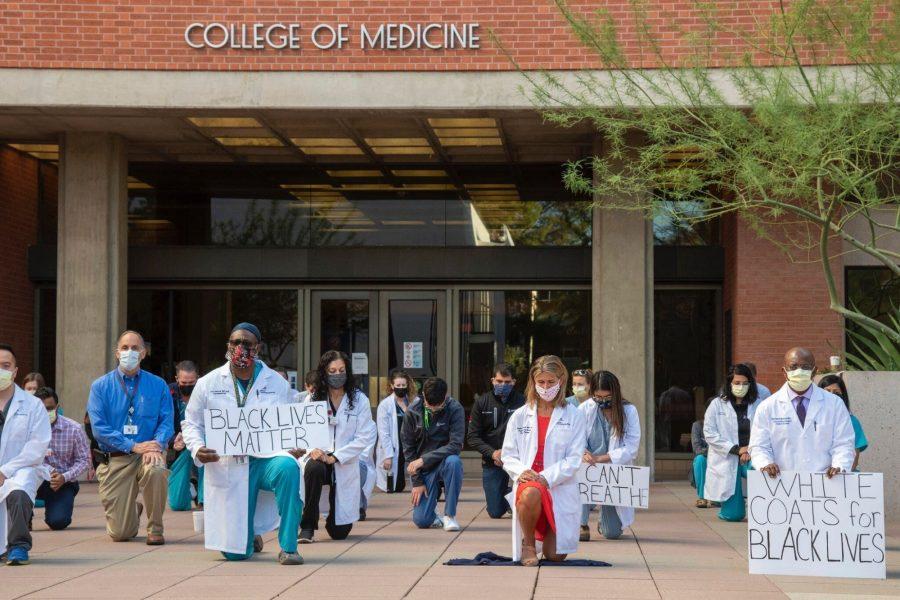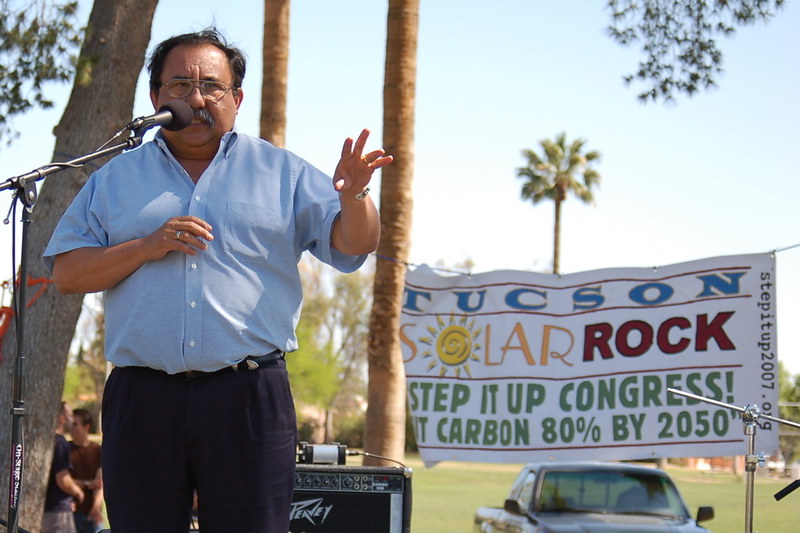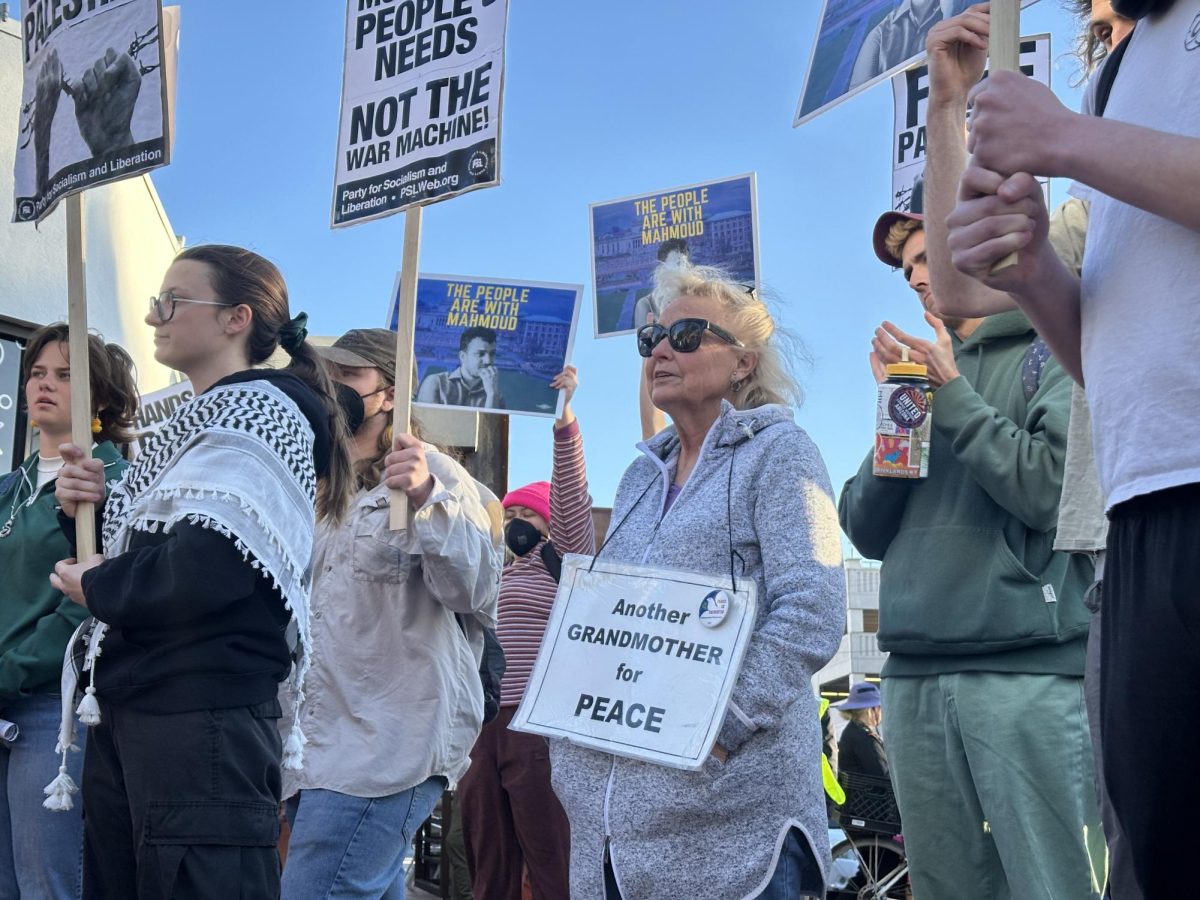Healthcare workers and faculty from the University of Arizona College of Medicine knelt in front of the entrance to the college Monday morning to demonstrate their support as “white coats for black lives.”
According to its website, White Coats for Black Lives is “a medical student-run organization born out of the National White Coat Die-In demonstrations that took place on December 10, 2014.” The movement seeks “to dismantle racism in medicine and promote the health, well-being, and self-determination of people of color.”
The organization lists the following goals on its website: “foster dialogue on racism as a public health concern,” “end racial discrimination in medical care” and “prepare future physicians to be advocates for racial justice.”
RELATED: A Celebration of Black Lives on the UA Mall
Demonstrators knelt at the College of Medicine — Tucson plaza Monday morning and took a moment of silence to reflect on and commit to “improving the health and safety of people of color.”
“We kneeled for ten minutes and we got to see the College of Medicine dean and multiple chairmen there, as well as residents and trainees, to help develop a culture of safety where people understand we kneel against the things that have got us to this point: bigotry, racism, all those things,” said Dr. Bellal Joseph, professor of surgery and chief of the division of trauma.
The demonstration was organized by the Department of Surgery under the leadership of Dr. Taylor Riall. She offered the following statement in an email to the Daily Wildcat:
“With the events of the past week surrounding George Floyd’s death, we recognize the critical need to support each other as we process our feelings. This gathering demonstrated our support of our African American colleagues and our commitment to eliminate racism and social injustice. Our Department is committed to continual learning, self-reflection, ongoing conversation, and definitive action to achieve this in the Department of Surgery, College of Medicine, our professional societies, our day-to-day lives, and beyond. I am proud to have a diverse leadership team who strengthen me and the Department of Surgery. We will emerge stronger as we embrace our diversity and understand the many complex feelings and questions that may arise as we confront the recent events.”
Several faculty members — all medical professionals — voiced their support for the demonstration.
“I think it’s extremely important to make sure that everyone knows that the institutions here at the University of Arizona are strong advocates for social justice and equity,” said Dr. Michael Abecassis, the dean of the College of Medicine at the UA.
He spoke to the Daily Wildcat about the importance of demonstrations like the one on Monday.
“It’s an acknowledgement of the pain and suffering that is caused by racial injustices, that have plagued this country for hundreds of years. It’s time that all of us take part in acknowledging it and doing something about it,” he said.
Dr. Valentine Nfonsam, professor of surgery, chief of the division of surgical oncology and program director of General Surgery Residency, described to the Daily Wildcat what the demonstration meant to him.
“The demonstration actually means a lot to me. It’s finally a recognition of the ongoing disparities and racism and lack of opportunity, and also discontent in the minority community as it relates to their relationship with the police,” Nfonsam told the Daily Wildcat in a video call. “As physicians, we are confronted with this immense social disparity every day because underrepresented minorities and patients of color are clearly treated by the medical community differently. There’s also disease burden seen in these patients and the reason why is clearly due to lack of access to our healthcare system. We clearly see embedded racism in our societal fabric that manifests in so many ways, including healthcare, so for surgeons to stand up and say they would like to see a change in this, is exactly, I think, commendable.”
RELATED: A running list of statements made by UA organizations regarding George Floyd and protests
Joseph described how his personal experience both as a surgeon and in the field of trauma relates to the movement.
“As a trauma surgeon, we deal with violence on a daily basis,” Joseph said. “What these demonstrations mean is that this is a health-based disease … structural violence is actually a disease. We do a lot with injury prevention, so for me to see these things, it shows me that there is impact in healthcare policy.”
While he acknowledged the progress made in years past, Joseph said that there’s always room for improvement in the space of equity and inclusion.
“I think the College of Medicine here has already taken some steps here with the Office of Diversity & Inclusion. However, the recent events have definitely catalyzed or pushed forward the deeper issues that need to be talked about, the more difficult conversations, and I think every inch in this direction is better than where we were yesterday. The goal would be not only to change for now, but for future students and a residents and faculty … The fact that this has reached even our healthcare — our hospitals — this wouldn’t have happened a few years ago.”
Follow Kristijan Barnjak on Twitter









